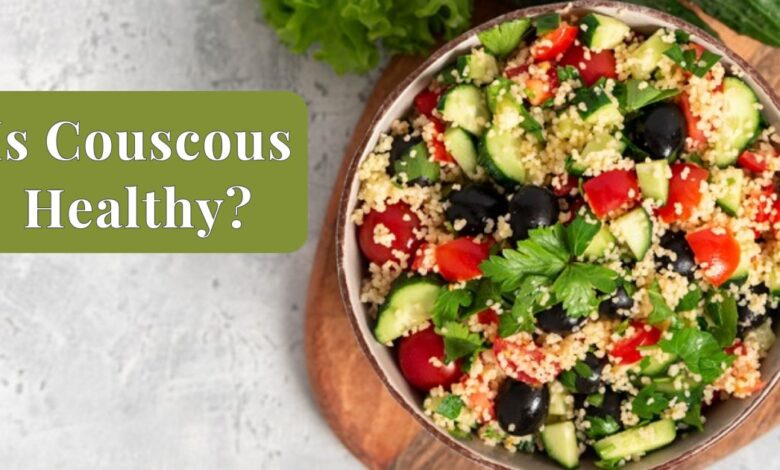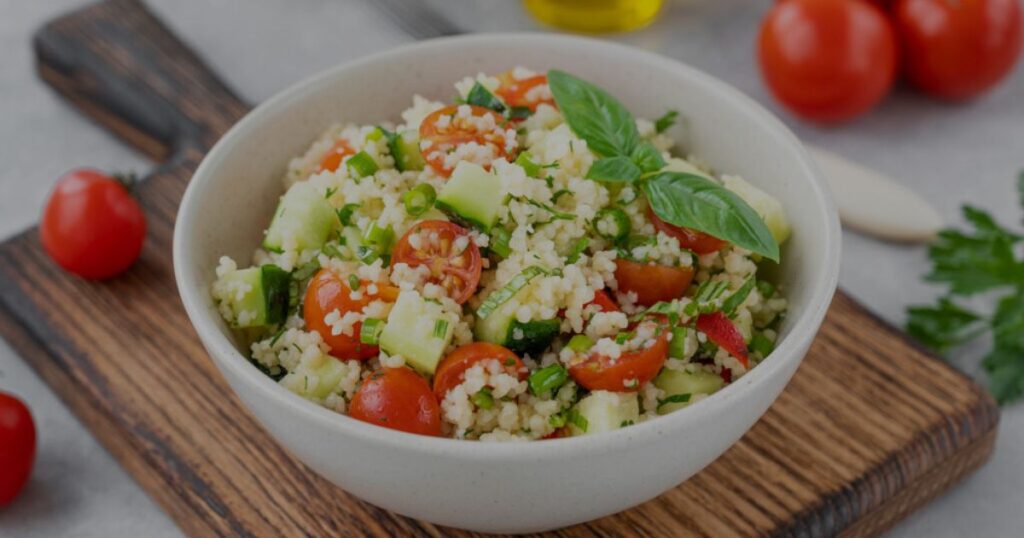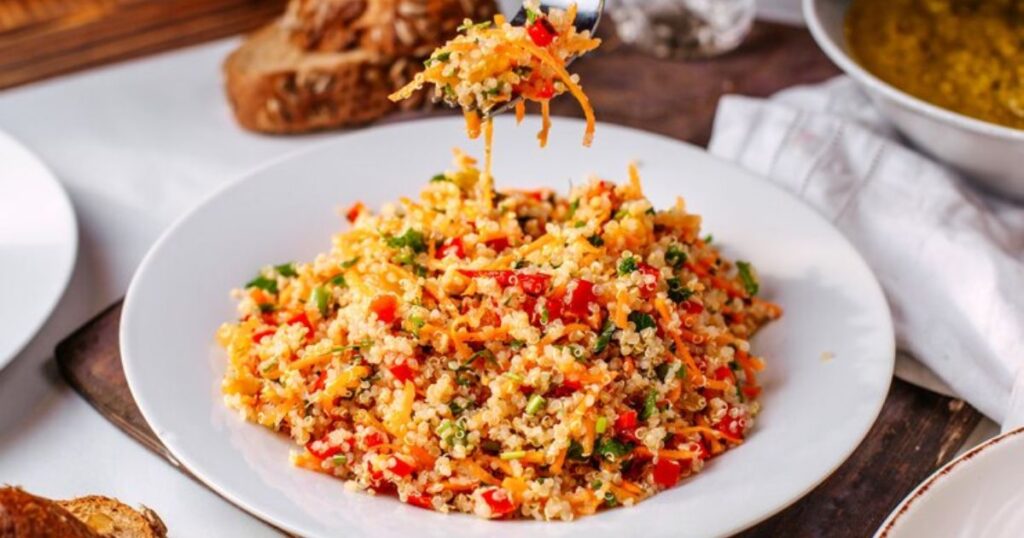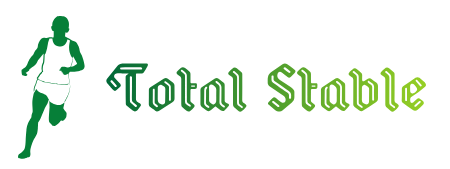Is Couscous Healthy? Couscous vs Quinoa

Couscous has been a common food in North Africa for an exceptionally long time, but is it good for you? As more people around the world start eating it, many are asking if couscous is a healthy choice to add to their meals.
In this article, we will discuss what couscous is. We will also look at its health benefits and any potential issues. Finally, we will share tips on how to cook it in a healthier way.
What Is Couscous?
Couscous is sometimes mistaken for a grain, although it is actually a form of pasta produced from semolina flour. It comes in small, granule-like sizes and cooks quickly, making it a convenient choice for many households.
Couscous originated in North Africa, and people have consumed it for generations. A popular meal exists in Morocco, Algeria, and Tunisia. Traditionally, cooks prepare it and serve it alongside vegetables, meat, or fish.
Three main types of couscous exist:
- Moroccan couscous – the smallest grain and the quickest to cook.
- Israeli couscous (also known as pearl couscous) – larger, resembling small pearls.
- Lebanese couscous – the largest, with a more substantial texture.
Nutritional Value of Couscous
Couscous offers a good balance of macronutrients and micronutrients for nutritional value.
Macronutrients in Couscous
Couscous is primarily a carbohydrate source, providing energy to the body. One cup (157 grams) of cooked couscous contains:
- Calories: 176
- Carbohydrates: 36 grams
- Protein: 6 grams
- Fat: Less than 1 gram
Micronutrients in Couscous
Couscous also contains important vitamins and minerals, including:
- Selenium: 43% of the daily recommended value (DV)
- Manganese: 8% of the DV
- Folate: 7% of the DV
- Iron: 5% of the DV

Is Couscous Healthy?
You can mix couscous, a healthy type of grain, with vegetables, beans, lean meats, and good fats to create tasty meals. Because it has less fat, it is a lighter choice compared to heavier grains like rice or pasta.
But, couscous may not be a good option for people who have gluten intolerance or celiac disease. Eating it in the right amount is also important. If you eat too much, you might take in too many calories, which isn’t good for you.
What Are The Health Benefits of Couscous?
1. Rich in Selenium
Couscous has a lot of selenium, which is one of its most important health benefits. Selenium is a trace mineral that helps the body’s antioxidant defenses.
It helps neutralize free radicals. These are unstable chemicals that can harm cells. They can also lead to chronic diseases like cancer and heart disease.
A single cup of couscous contains more than 60% of the daily required amount of selenium. This makes couscous a good choice for anyone wishing to increase their intake of this vital nutrient.
2. Promotes Heart Health
Couscous is a heart-healthy food because it has low fat and high levels of selenium. Selenium reduces inflammation and oxidative stress, both of which researchers associate with heart disease. Couscous’ fiber content also helps manage cholesterol levels, which promotes cardiovascular health.
Couscous can help lessen your chance of developing heart disease and related illnesses like stroke or atherosclerosis.
3. Digestive Health
Fiber is important for a healthy digestive system. Couscous may not have the most fiber, but it has enough to help keep bowel movements regular. A high-fiber diet helps to prevent constipation and stimulates the growth of good bacteria in the stomach.
Couscous can improve your digestive health. It may also lower your risk of diseases like irritable bowel syndrome (IBS) and colon cancer.
4. Helps in Weight Management
Couscous is an excellent food for individuals wanting to control or lose weight. It contains fewer calories than other grains such as rice or quinoa, making it a lighter option for meals. Furthermore, its fiber content keeps you feeling fuller for longer, lowering the possibility of overeating.
Couscous is low in fat and high in protein, making it a delicious and nutritious addition to a weight-loss strategy.
5. Provides a Source of Plant-Based Protein
Although couscous is not as high in protein as legumes or meat, it does provide a good source of plant-based protein. This makes it an excellent choice for vegetarians and vegans wishing to add diversity to their diets.
Protein is essential for muscle repair and growth, as well as maintaining a strong immune system. Adding couscous to meals with other protein sources, such as chickpeas or lentils, can help you achieve your daily protein needs.

Couscous vs. Quinoa: Which Is Healthier?
When comparing couscous and quinoa, several factors determine which is healthier for you. Here’s a breakdown of both:
Nutritional Profile
- Couscous:Calories: Generally higher in calories.
- Carbohydrates: Contains more carbohydrates, which can provide quick energy.
- Protein: Lower in protein compared to quinoa.
- Vitamins and Minerals: Contains some B vitamins and selenium but lacks a wide range of nutrients.
- Quinoa:Calories: Slightly lower in calories.
- Carbohydrates: Contains complex carbohydrates, which are better for sustained energy.
- Protein: Higher in protein and contains all nine essential amino acids, making it a complete protein source.
- Vitamins and Minerals: Rich in fiber, iron, magnesium, and antioxidants.
Health Benefits
- Couscous:
- Good source of energy due to its carbohydrate content.
- May be beneficial in moderation, but lacks some of the nutrients that quinoa provides.
- Quinoa:
- Known for its high protein content, making it a great choice for vegetarians and vegans.
- Rich in fiber, which aids in digestion and helps maintain a healthy weight.
- Contains essential nutrients that support overall health, such as magnesium and iron.
Conclusion
Couscous can be a good food to eat if you don’t eat too much of it. It has low fat and provides plant-based protein. It also contains selenium, which helps keep your heart healthy and boosts your immune system.
But if you can’t eat gluten or are trying to avoid carbs, couscous might not be the best choice for you. The important thing is to eat couscous in a balanced way as part of a healthy diet. It’s a food that comes from North Africa.
People Also Ask
1. Is couscous good for your health?
Couscous is healthful because it has less fat and calories. It contains fiber, which helps your stomach feel full and regulates your digestion. Couscous also contains some protein, which is beneficial for muscular development.
2. Is couscous better than rice?
Couscous and rice are both nutritious, although couscous often has more fiber and protein. Rice contains more carbohydrates, which provide you energy. Couscous is an excellent alternative if you want to increase your fiber intake. If you desire more energy, rice may be a better option.
3. Does couscous help you lose weight?
Couscous can help you lose weight since it fills you up without using a lot of calories. Couscous’ fiber also helps you feel fuller for longer, preventing you from overeating.
4. Is couscous gluten-free?
No, couscous is not gluten free. Wheat contains gluten, which makes it. If you cannot eat gluten, you should avoid couscous and instead opt for rice or quinoa.
5. What nutrients are in couscous?
Couscous contains essential elements such as fiber, protein, and vitamins like B vitamins. It also contains minerals such as selenium, which promotes overall health and strengthens the immune system.




